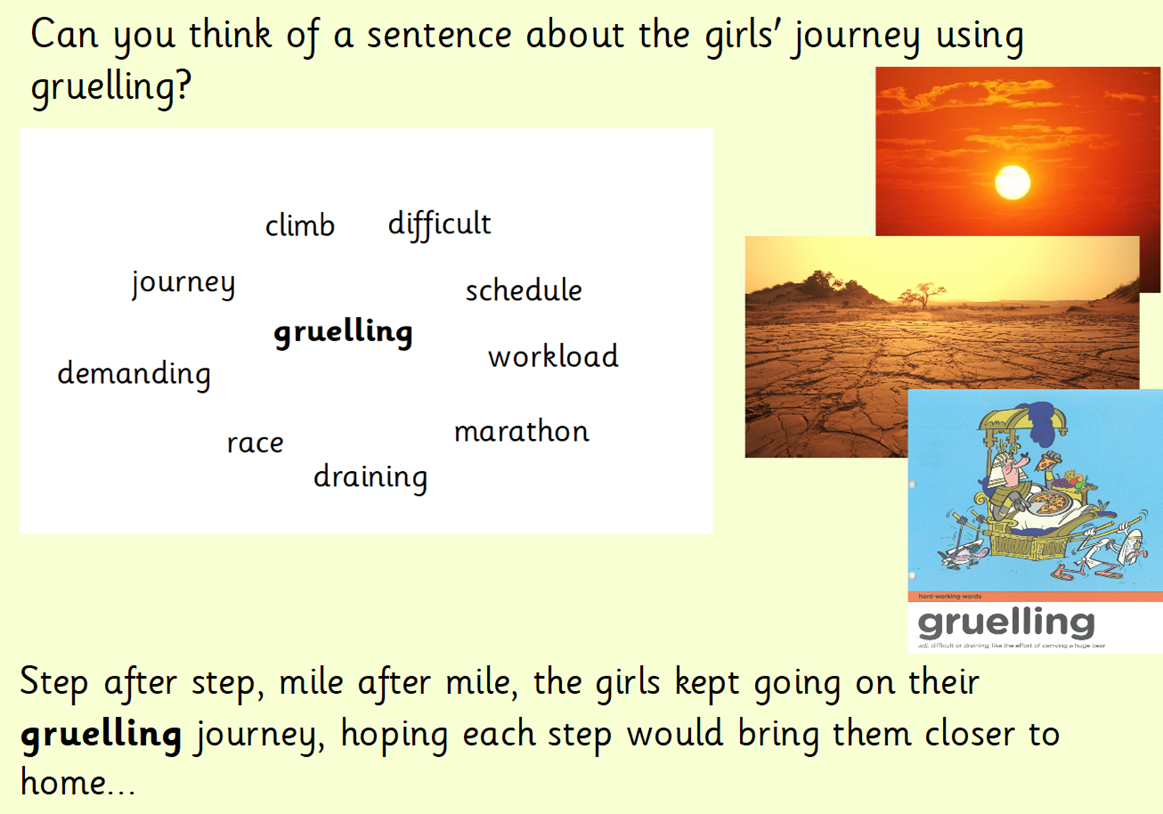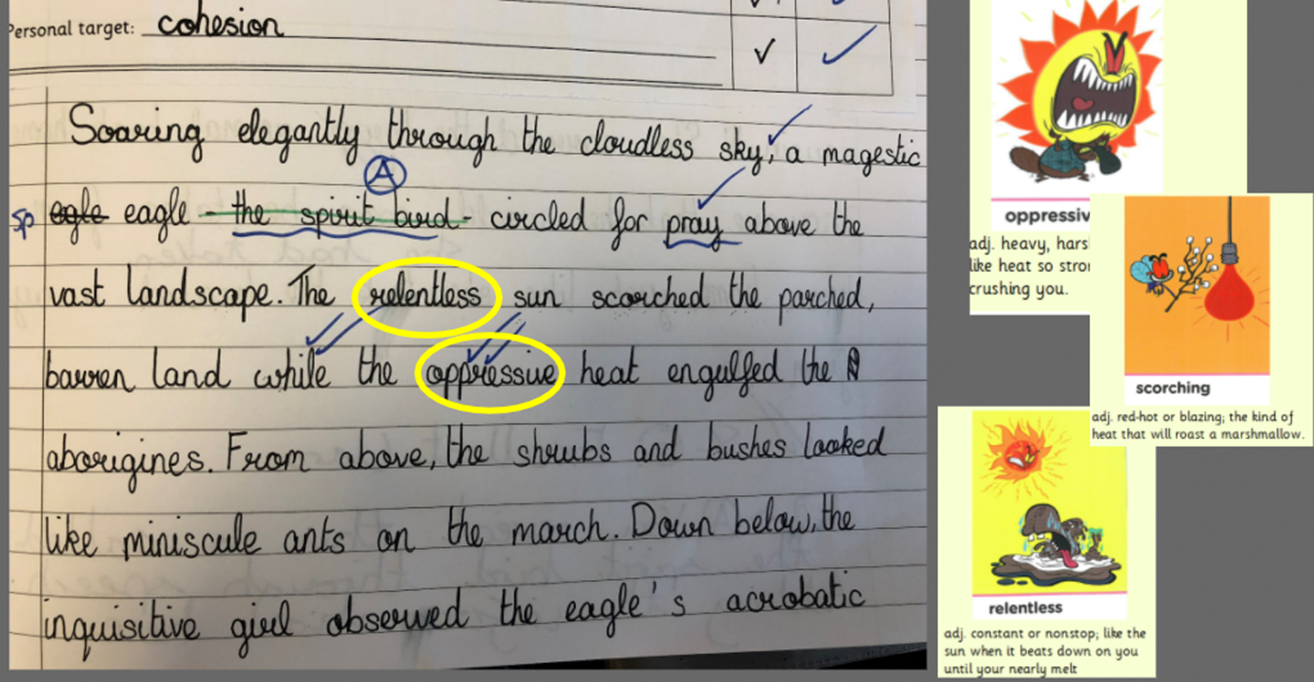Article Post
18 Jan 2022
by Emma Madden
Using Mrs Wordsmith products to support vocabulary and literacy development in the classroom
In my school, like so many others nationally, we have been really focused on how to develop pupils’ language and vocabulary across the curriculum, from the moment they enter in the Early Years until the end of Year 6. Now, more than ever, teachers are recognising the importance of closing the vocabulary gap through explicit teaching of vocabulary, rather than assuming the children will ‘catch it’ by themselves.
We have loved using the Mrs Wordsmith Storyteller’s Word A Day resources to help develop our pupils’ use of narrative vocabulary from Year 2 to Year 6. There are several reasons it is so effective:
- The selected narrative vocabulary is expertly selected - the perfect ‘ambitious’ Tier 2 words to help pupils ‘uplevel’ their writing, and comprehend in more sophisticated reading. Word selection is a challenge in itself!
- Each carefully selected word has a hilarious illustration to match, supporting understanding, but also hooking the pupils in with humour.
- Simple, child-friendly definitions are provided (much easier to understand than those you find in a dictionary).
- Synonyms are provided, which help pupils to understand the meaning and nuance of the words.
- Word pairs are given - these are common co-locates of words, helping pupils to quickly grasp ways in which to ‘apply’ newly learnt words, e.g. for the word colossal, you might have a colossal statue, colossal mistake, or colossal task.
- Extracts of the chosen words used in classic literature are also included, which pupils find exciting and motivating to see.
- Etymology is introduced, giving children hooks to understand the meaning, as well as developing their word consciousness.
Including all these aspects helps us to help the children to learn, understand and then use the new words so quickly… words such as gruelling, gorge and brazen; putrid, ominous and sneer; words which help them to write more purposefully, with more precision; and words which they can the understand in their reading!

In order to make the most of the resource, there are several teaching strategies we use to maximise the impact and speed of acquisition of this vocabulary:
- We always ensure the pupils can say the words out loud, several times, often with my-turn, your-turn. If they can’t say it, there’s no way they will remember it.
- When reviewing synonyms, we always look at the word in the context of a sentence, to demonstrate how synonyms are generally a consistent word class.
- e.g. “Step after step, mile after mile the girls kept going on their gruelling journey.” Replace the word gruelling with an appropriate synonym: difficult, draining or demanding.

- When introducing the word pairs, we get the children to say paired words aloud, “ominous clouds, an ominous sign, an ominous shadow.” Again, this helps to embed these common applications of the word in their memory.
- We link the new words and word pairs to experiences that the children have had, and knowledge (and schema) they have already developed. “Have you ever made a colossal mistake?” “Which character in our class book could you describe as brazen?”
- Where possible, we use drama to reinforce word meaning. “Show me a sneer!”
- We develop and apply grammar knowledge in conjunction with looking at words, through identifying the word classes that go together (in word pairs), adjectives and nouns “a colossal failure”, adverbs and verbs “greedily gorge”; as well as looking at different forms of the selected words, “an ominous sign”, or “she glared ominously.”
- We make time to revise previously learned vocabulary, by matching words to their images, or playing Mrs Wordsmith Bingo (a house point for using a Mrs Wordsmith word during the day, or spotting it when reading).
- We immediately apply the new vocabulary, by composing a sentence with the word in (orally or in written form). Wherever possible, we use a known and appropriate context: “We’ve been thinking about Oliver Twist this week. Can you use the word putrid in a sentence to describe the orphans seeing their gruel?”

By systematically teaching new ambitious narrative vocabulary, we have seen significant impact in the children’s writing and reading! We have developed a strong culture of word consciousness, a climate of interest and involvement in words, which research tells us helps pupils both acquire vocabulary more quickly and become better spellers. Best of all, the children have great fun at the same time. What’s not to love!
We all really enjoy the Mrs Wordsmith resources, the illustrations, the humour, and most of all the robustness of the pedagogy.
Emma Madden is Head of School at Fox Primary School and Head of Curriculum for the Fox Federation and CPD Programme.
Mrs Wordsmith Storyteller's Word A Day, Ages 7-11 (Key Stage 2) has been shortlisted as an Education Resource Awards finalist, in the category "Primary resource -non ICT".
These awards are recognised by the teaching profession as the benchmark of excellence, aiming to encourage the raising of educational services and product standards throughout the industry
